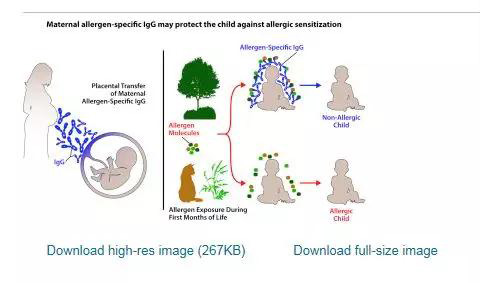JACI:孕婦過敏原特異性IgG檢測的意義
發(fā)布日期:2019-03-01
原標題:母親體內(nèi)的過敏原特異性IgG可保護孩子免受過敏

延伸閱讀
JACI Available online 25 January 2019
https://doi.org/10.1016/j.jaci.2018.11.051
Abstract:
Abstract
Background
The analysis of allergen-specific IgE responses in birth cohorts with micro-arrayed allergens has provided detailed information regarding the evolution of specific IgE responses in children. High resolution data regarding early development of allergen-specific IgG are needed.
Objective
To analyze IgG reactivity to micro-arrayed allergens in mothers during pregnancy, in cord blood samples, breast milk and in infants in the first years of life with the aim to investigate if maternal allergen-specific IgG may protect against IgE sensitization in the offspring.
Methods
Plasma samples from mothers during third trimester, cord blood, breast milk collected at 2 months after delivery, and plasma samples from children at 6, 12 and 60 months of age were analyzed for IgG reactivity to 164 micro-arrayed allergens (ImmunoCAP ISAC technology) in 99 families in the Swedish birth cohort ALADDIN. IgE sensitizations to micro-arrayed allergens were determined at 5 years of age in the children.
Results
Allergen-specific IgG reactivity profiles in mothers, cord blood and breast milk were highly correlated. Maternal allergen-specific IgG persisted in some children at 6 months. Children′s allergen-specific IgG production occurred at 6 months and reflected allergen exposure. Children who were IgE-sensitized against an allergen at 5 years of age had significantly higher allergen-specific IgG levels than non-sensitized children. For all 164 tested allergens, children from mothers with elevated (>30 ISU) specific plasma IgG against an allergen had no IgE sensitizations against that allergen at 5 years of age.
Conclusion
This is the first detailed analysis of the molecular IgG recognition profile in mothers and their children in early life. High allergen-specific IgG reactivity in mother′s plasma and breast milk and in cord blood seemed to protect against allergic sensitization at 5 years of age.
Clinical implication
High levels of allergen-specific IgG in mothers during third trimester and in cord blood seem to protect against allergic sensitization in the offsprings. This finding has implications for the prevention of allergy.
All Authors:
lChristianLupinekMDa+HeidrunHochwallnerPhDa+CatharinaJohanssonPhDbAxelMiePhDbEvaRiglerMD, PhDaAnnikaScheyniusMD, PhDbcJohanAlmMD, PhDbcRudolfValentaMDade


——浙大迪迅 譯
?、僭诔錾犃兄校梦㈥嚵羞^敏原的方法對兒童進行過敏原特異性IgE應(yīng)答分析,已經(jīng)獲得了兒童中特異性IgE應(yīng)答演變的詳細信息。需要關(guān)于過敏原特異性IgG早期進化的高分辨率數(shù)據(jù)。②分析妊娠期、臍帶血樣本、母乳和嬰兒出生后第一年的IgG對微陣列過敏原的反應(yīng)性,目的是研究母親的過敏原特異性IgG是否可以防止子代IgE致敏。③在瑞典99個家庭的出生隊列中,對母親血漿樣本、臍帶血、母乳及子代不同時間點血漿分析164微陣列過敏原(ImmunoCAP ISAC technology)的IgG反應(yīng)性,母親的血漿在懷孕后期采集, ,母乳的收集在分娩后2個月, 兒童血漿樣本在6、12和60個月時采集。IgE對微排列過敏原的敏感性是在兒童5歲時測定的。④母親血漿、臍帶血和母乳中的過敏原特異性IgG反應(yīng)譜之間有高度相關(guān)性。母親過敏原特異性IgG在一些6個月大的兒童中持續(xù)存在。孩子的過敏原特異性IgG在6個月時產(chǎn)生,反映了過敏原暴露。5歲時對過敏原IgE敏感的兒童比不敏感的兒童具有更高的過敏原特異性IgG水平。在所有164種測試過敏原中,對過敏原血清IgG升高(>30 ISU)的母親的孩子在5歲時對該過敏原沒有IgE敏感性。⑤這是第一次詳細分析了母親及其子代早期在分子層面的IgG識別譜。母親血漿和母乳及臍帶血中過敏原特異性IgG的高反應(yīng)性在孩子5歲時看起來具有防止過敏的作用。⑥在妊娠晚期的母親體內(nèi)和臍帶血中高水平的過敏原特異性IgG似乎可以防止后代的過敏。這一發(fā)現(xiàn)對預防過敏有意義。
延伸閱讀
JACI Available online 25 January 2019
[IF:13.1]
Maternal allergen-specific IgG may protect the child against allergic sensitizationhttps://doi.org/10.1016/j.jaci.2018.11.051
Abstract:
Abstract
Background
The analysis of allergen-specific IgE responses in birth cohorts with micro-arrayed allergens has provided detailed information regarding the evolution of specific IgE responses in children. High resolution data regarding early development of allergen-specific IgG are needed.
Objective
To analyze IgG reactivity to micro-arrayed allergens in mothers during pregnancy, in cord blood samples, breast milk and in infants in the first years of life with the aim to investigate if maternal allergen-specific IgG may protect against IgE sensitization in the offspring.
Methods
Plasma samples from mothers during third trimester, cord blood, breast milk collected at 2 months after delivery, and plasma samples from children at 6, 12 and 60 months of age were analyzed for IgG reactivity to 164 micro-arrayed allergens (ImmunoCAP ISAC technology) in 99 families in the Swedish birth cohort ALADDIN. IgE sensitizations to micro-arrayed allergens were determined at 5 years of age in the children.
Results
Allergen-specific IgG reactivity profiles in mothers, cord blood and breast milk were highly correlated. Maternal allergen-specific IgG persisted in some children at 6 months. Children′s allergen-specific IgG production occurred at 6 months and reflected allergen exposure. Children who were IgE-sensitized against an allergen at 5 years of age had significantly higher allergen-specific IgG levels than non-sensitized children. For all 164 tested allergens, children from mothers with elevated (>30 ISU) specific plasma IgG against an allergen had no IgE sensitizations against that allergen at 5 years of age.
Conclusion
This is the first detailed analysis of the molecular IgG recognition profile in mothers and their children in early life. High allergen-specific IgG reactivity in mother′s plasma and breast milk and in cord blood seemed to protect against allergic sensitization at 5 years of age.
Clinical implication
High levels of allergen-specific IgG in mothers during third trimester and in cord blood seem to protect against allergic sensitization in the offsprings. This finding has implications for the prevention of allergy.
All Authors:
lChristianLupinekMDa+HeidrunHochwallnerPhDa+CatharinaJohanssonPhDbAxelMiePhDbEvaRiglerMD, PhDaAnnikaScheyniusMD, PhDbcJohanAlmMD, PhDbcRudolfValentaMDade
2019-1-30 Article
創(chuàng)建過敏性疾病的科研、科普知識交流平臺,為過敏患者提供專業(yè)診斷、治療、預防的共享平臺。

 杭州浙大迪迅生物基因工程有限公司
杭州浙大迪迅生物基因工程有限公司

